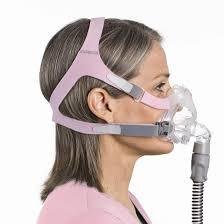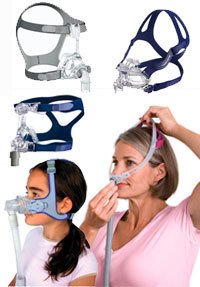This post may contain Amazon® product affiliate links. We may receive a commision if you make a purchase after clicking on one of these links but at no cost to you. Please visit Our Disclosure Page for more information. Thank you.
If you have been diagnosed with apnea, your challenges are just beginning. Your doctor will prescribe CPAP or BIPAP therapy, which consists of a machine and BIPAP mask that pushes a level of air pressure into your lungs during sleep, preventing apnea episodes from occurring.
Meeting Your Apnea Needs
 There are a number of myths associated with apnea treatment and the type of mask you can use. Most people falsely believe that they need to use the same brand of mask as their BIPAP device. This is not true because most apnea masks can be used with CPAP or BIPAP machines, regardless of the brand.
There are a number of myths associated with apnea treatment and the type of mask you can use. Most people falsely believe that they need to use the same brand of mask as their BIPAP device. This is not true because most apnea masks can be used with CPAP or BIPAP machines, regardless of the brand.
In America, it’s true that you’ll need a prescription from your sleep specialist in order to purchase an apnea mask. In recent years, the FDA has changed the rules of apnea treatment to require a prescription for humidifiers and masks. However, it’s still possible to get replacement parts for your mask without a prescription.
Before you purchase a mask, it’s important to first consider your needs at night, such as do you sleep on your side, do you enjoy reading at night and do you like watching TV in bed? If you answered yes to any of these questions then you’ll want to avoid using a full face mask and opt for a nasal pillow model instead. Nasal pillow models are very compact, inserting inside the nares and they allow you to read or watch TV without obstructing your view. A full face mask will make it impossible to do these things. A nasal pillow mask is a good option for people who prefer not to have a lot of mask contact on their face.
Next, you’ll need to consider whether you breathe through your nose, mouth or both. Many people are given nasal masks initially and this type of mask will make treatment ineffective if you breathe out of your mouth. If you can’t tolerate breathing through your nose or your mouth falls open during sleep, you can purchase an apnea chinstrap, which works to keep your mouth comfortably closed during sleep.
How to Choose the Right type of Mask for BIPAP
 Other factors to take into account include do you have facial hair, do you use cream on your face at night, and are you claustrophobic?
Other factors to take into account include do you have facial hair, do you use cream on your face at night, and are you claustrophobic?
If you have facial hair, you’ll be limited in the styles of masks you can choose from, unless you’re willing to shave.
If you use cream on your face at night, this can prevent the mask from sealing correctly, which will result in a mask leak. Mask leaks will make BIPAP or CPAP treatment ineffective.
If you suffer from claustrophobia, then you may worry when you’re told you need to wear a face mask during the night. A full face mask can make it impossible for you to sleep, so your best option will be the nasal pillows.
